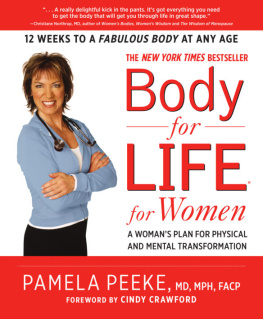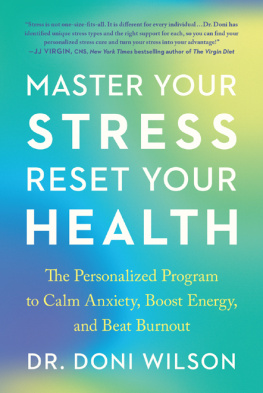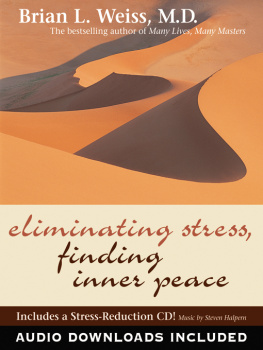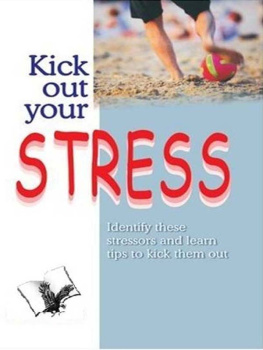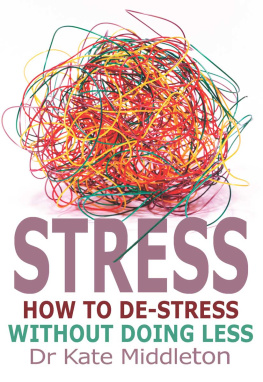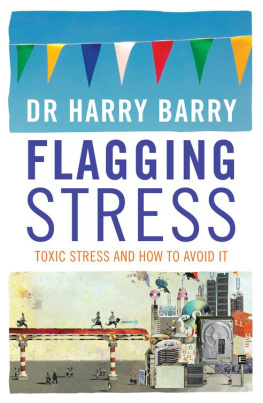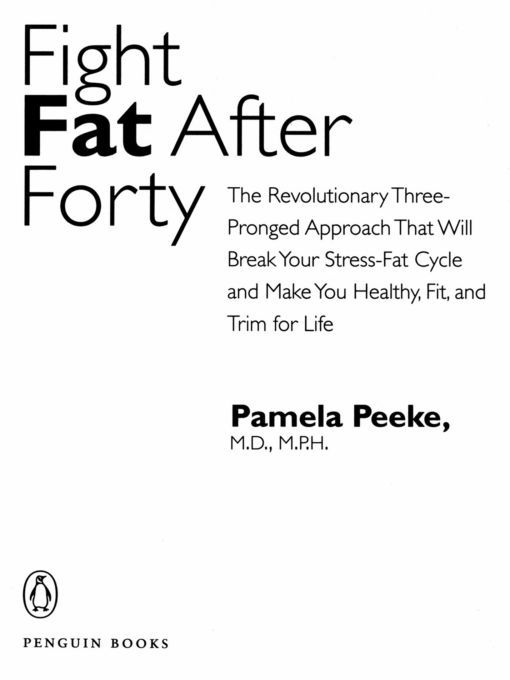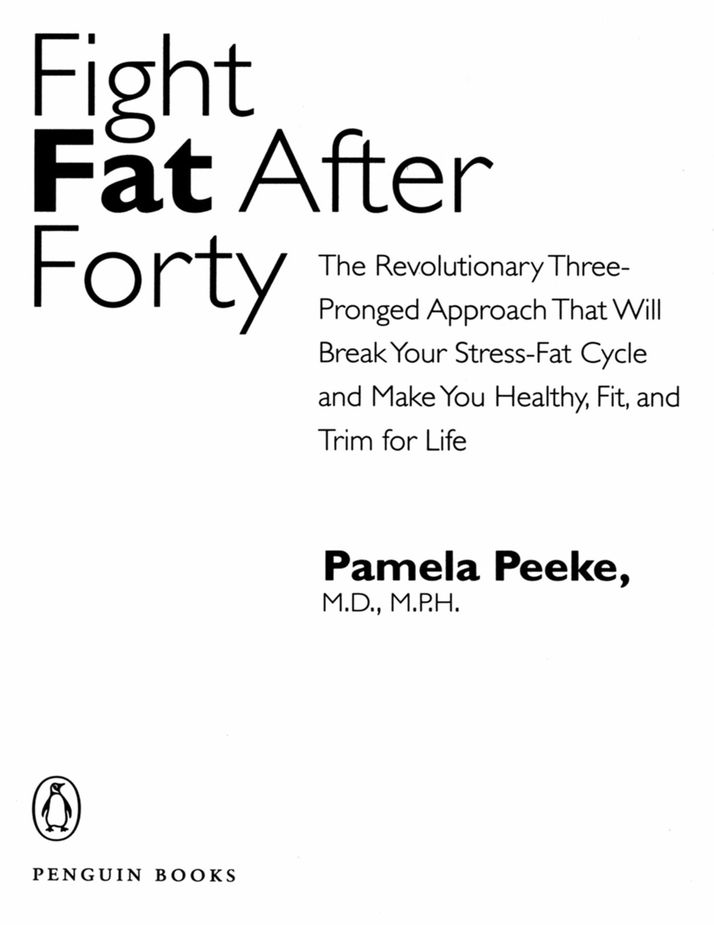Table of Contents
Praise for Pamela Peeke and Fight Fat After Forty
Another piece of the stress management puzzle is yet better defined! Dr. Peeke explores how stress directly affects your body composition and shows how you can control your weight by harnessing the minds power to achieve stress resilience.
Herbert Benson, M.D., Mind-Body Medical Institute, Associate Professor of Medicine, Harvard University, author of The Relaxation Response and Timeless Healing
Dr. Pam Peeke, a wizard of science, medicine, and the tender mysteries of the human heart, shows us how to shed the physical and mental weight that prevents us from becoming most fully and vibrantly ourselves.
Joan Borysenko, Ph.D., author of Minding the Body, Mending the Mind
In Fight Fat After Forty, Dr. Peeke has made critical contributions as to how stress influences obesity and why obesity so often defeats the efforts of the most motivated dieters. She is the ideal person to be teaching the interested nonscientist about this important subject.
Robert Sapolsky, Professor of Biological Sciences, Stanford University School of Medicine, and author of Why Zebras Dont Get Ulcers
This book isnt about middle-aged spread, its about how stress makes you fat.... This book has far more brainpower than most diet books ... [its] value is largely in its explanation of the science and its charty tools intended to help you change when and how you eatand react to stress.
The Washington Post
ABOUT THE AUTHOR
Pamela Peeke, M.D., M.P.H., devoted three years to investigating the link between stress and fat at the National Institutes of Health as a senior research fellow. She is an internationally recognized expert and speaker in the fields of nutrition and stress as well as the newly evolving field of integrative medicine. She regularly appears as a science and health news commentator for the major networks. She is Assistant Clinical Professor of Medicine at the University of Maryland School of Medicine.
I dedicate this book to all of the women and men who have shared their life stories with me. I will never cease to be amazed at the courage, tenacity, and depth of passion they have shown as, together, we continue to find ways to live more joyfully.
Specifically, I want to dedicate this book to my patients who have tirelessly given of their time and effort to help me understand their life journeys.They have taken part in retreats, focus groups, and gatherings to share their histories and experiences as they have grappled with the issues of self-esteem, accomplishment, self-care, and self-worth in the face of the constant onslaught of lifes daily stresses.
Some of their stories are told in this bookNaomi. Marcia, Marg, Karen, Madelyn, Helen, Eileen, Johari, Gioia, Deb, Jane, Susan, Barbara, Sylvia, Hillary, and so many others. I want to especially mention Leslie Milk without whom this book would have been impossible. I will never be able to thank her enough for her wit and insights about how truly powerful women are.
My greatest reward for my professional work is spending time with these extraordinary people.They are my muses.
Life is largely a process of adaptation to the circumstances in which we exist. A perennial give-and-take has been going on between living matter and its inanimate surroundings, between one living being and another, ever since the dawn of life in the prehistoric oceans. The secret of health and happiness lies in successful adjustment to the ever-changing conditions on this globe; the penalties for failure in this great process of adaptation are disease and unhappiness.
Hans Selye, M.D.
The Stress of Life
Foreword
I first spoke to Dr. Pamela Peeke almost a decade ago. The call was from the University of California at Davis, where she was completing her work as a Pew Foundation Scholar at their famed graduate school of nutrition.
Her voice was clear and strong, and what she wanted from me was unequivocal. I have been following your work on stress science for years and I would like to work with you, she told me in her usual direct fashion. During that initial discussion, I realized she was a physician with a clear and determined purpose in life: to make a difference. A few months later she and her immense energy were in my laboratory at the National Institutes of Health, conducting exciting new research studies showing the connection between stress and weight.
My research at the time was focused on improving our understanding of how stress hormones influence the mind and body during human development and womens life transitions from birth through menopause. Dr. Peekes work enriched my laboratorys scope and widened my own perspective in a field that I had only lightly touched in my past research. It did not take us long to realize that stress and the hormones secreted during stress are major culprits in the development of obesity. And furthermore, that stress management, based on solid scientific evidence, could make a life-saving difference in reversing what appears to be a national epidemic of weight gain, especially after the age of forty.
Over the past twenty years, scientists progressively realized that not all fat in the body is a cause of illness. It appeared that the most life-threatening fat was not the excess weight on hips and thighs, but the fat situated deep inside our abdomens. Normally, this intra-abdominal, or visceral fat, is there to help provide the calories or fuel needed in times of physical stress. Dr. Peeke and I refer to this fat as stress fat. It was already known that unhealthy eating and physical inactivity caused more stress fat to accumulate. Research soon revealed that chronic, uncontrolled stress could also result in excess stress fat, even if that individual was not overweight. And that the excess fat was potentially lethal, causing metabolic abnormalities, high blood pressure, diabetes, and heart disease. The body weight associated with this type of fat should then be referred to as Toxic Weight.
Furthermore, although the accumulation of Toxic Weight can actually start in the womb, individuals over the age of forty are at particular risk for this type of weight gain. Of great concern are over-forty women as they journey through the perimenopause. Hormonal changes, increasing stresses of caregiving as well as difficulty setting priorities for their own self-care are the triple threat that leads to the accumulation of Toxic Weight.
Dr. Peeke recognized this situation as a call to arms to make women and men aware of this vicious stress-induced weight-gain cycle. With passion, she has written a state of the art book, explaining in simple terms the complex science behind the stress-fat connection and what can be done to reverse it.
As her scientific mentor, it was a great pleasure to meet and speak with many of her patients whose life stories are included and analyzed in this book and to see the results of Dr. Peekes therapeutic approach with them. I understand that it takes more than research, more than science, more than a technician in a white coat to make a difference. It takes someone special to bring that knowledge out of the laboratory and into the hands of women and men who need it. Using a holistic, well-integrated approach, combining science with practical tools to cope with daily stresses, Dr. Peeke provides a rational guide to sustainable lifestyle changes that will finally break the stress-fat cycle for life.


